Related Research Articles

The politics of Bolivia takes place in a framework of a presidential representative democratic republic, whereby the president is head of state, head of government and head of a diverse multi-party system. Executive power is exercised by the government. Legislative power is vested in both the government and the two chambers of parliament. Both the Judiciary and the electoral branch are independent of the executive and the legislature. After the 2014 Bolivian general election, 53.1% of the seats in national parliament were held by women, a higher proportion of women than that of the population.
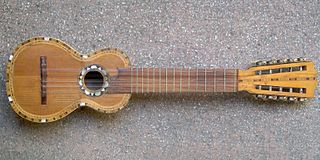
The charango is a small Andean stringed instrument of the lute family, from the Quechua and Aymara populations in the territory of the Altiplano in post-Colonial times, after European stringed instruments were introduced by the Spanish during colonialization. The instrument is widespread throughout the Andean regions of Bolivia, Peru, Ecuador, northern Chile and northwestern Argentina, where it is a popular musical instrument that exists in many variant forms.
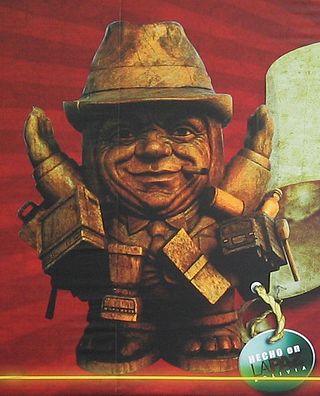
The Ekeko is the Tiwanakan god of abundance and prosperity in the mythology and folklore of the people from the Altiplano. Its chief importance in popular culture is as the main figure of the annual Alasitas fair, a cultural event that happens every January 24 in La Paz, Bolivia. The Ekeko is a traditional god of luck and prosperity popular in the western region of Bolivia. In Peru the main festival is celebrated on May 3 of every year in the city of Puno, on the Machallata hill.

The armónico, also known as trilina, is a guitar-like instrument from Cuba. It is a hybrid between the Spanish guitar and the Cuban tres. The armónico has seven strings: five single strings, plus one pair of strings tuned in unison. The armónico was invented by Cuban trova musician Compay Segundo, who loved the instrument as it allowed him to exploit the possibilities of both the guitar and the tres.
The music of Bolivia has a long history. Out of all the Andean countries, Bolivia remains perhaps the most culturally linked to the indigenous peoples.
Peruvian music is an amalgamation of sounds and styles drawing on Peru's Andean, Spanish, and African roots. Andean influences can perhaps be best heard in wind instruments and the shape of the melodies, while the African influences can be heard in the rhythm and percussion instruments, and European influences can be heard in the harmonies and stringed instruments. Pre-Columbian Andean music was played on drums and string instruments, like the European pipe and tabor tradition. Andean tritonic and pentatonic scales were elaborated during the colonial period into hexatonic, and in some cases, diatonic scales.
Los Jairas was a Bolivian folk music group that was active in the 1960s. Their work features the charango, a stringed instrument from Bolivia.

Oruro is a department of Bolivia, with an area of 53,588 km2 (20,690 sq mi). Its capital is the city of Oruro. According to the 2012 census, the Oruro department had a population of 494,178.
The term requinto is used in both Spanish and Portuguese to mean a smaller, higher-pitched version of another instrument. Thus, there are requinto guitars, drums, and several wind instruments.

A tiple, is a plucked typically 12-string chordophone of the guitar family. A tiple player is called a tiplista. The first mention of the tiple comes from musicologist Pablo Minguet e Irol in 1752. Although many variations of the instrument exist, the tiple is mostly associated with Colombia, and is considered the national instrument. The Puerto Rican version characteristically has fewer strings, as do variants from Cuba, Mallorca, and elsewhere among countries of Hispanic origin.
Gilbert Favre was a clarinetist from Geneva, Switzerland. He trained at the Conservatory of Geneva, and also played jazz clarinet. In South America, he discovered the quena, and when he moved to Bolivia, he traded in his clarinet. In La Paz, he created the musical cabaret "La Peña Naira" at the Plaza San Francisco featuring indigenous music. The club became a hub for the diplomatic corps stationed in La Paz, as well as a favorite for Bolivians. Gilbert was the founding member of the popular Bolivian folk group Los Jairas. Favre was commonly referred to as "El Gringo" by the Bolivian public. Favre traveled from Geneva to South America as assistant to the Swiss anthropologist Jean Christian Spahni. In Santiago, Favre met celebrated Chilean folk singer Violeta Parra and fell in love. Favre played quena with Violeta and her son Angel Parra. He appears on recordings as "El Tocador Afuerino". Favre eventually left for Bolivia, where he created "La Peña Naira" and started experimenting with Andean music playing alongside virtuoso guitar player Alfredo Dominguez and renowned charango player Ernesto Cavour. Parra appeared several times at La Pena. Favre returned to Geneva in the early 1960s together with Parra; after a few years in Europe, they returned to South America. As the Trio Domínguez-Favre-Cavour gained media attention and became increasingly popular for their "neofolklore", Favre decided not to move back to Chile and left Parra for good; she would later write "Run Run Se Fue Pa'l Norte," dedicated to her lover. Violetta Parra would later commit suicide. Their relationship was portrayed in the award-winning film Violeta Went to Heaven (2011), in which Favre was played by Thomas Durand.
Latin alternative, or "alterlatino", or "Patchanka", is a brand of Latin rock music produced by combining genres like alternative rock, lofi, chillout, metal, electronica, hip hop, new wave, pop rock, punk rock, reggae, and ska with traditional Ibero-American sounds, in Latin Europeans and Latin Americans countries.
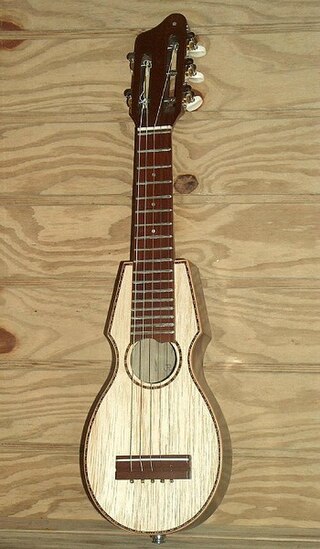
The tiple is the smallest of the three string instruments of Puerto Rico that make up the orquesta jibara. According to investigations made by Jose Reyes Zamora, the tiple in Puerto Rico dates back to the 18th century. It is believed to have evolved from the Spanish guitarrillo. There was never a standard for the tiple and as a result there are many variations throughout the island of Puerto Rico. Most tiples have four or five strings and most tiple requintos have three strings. Some tiples have as many as 6 strings and as few as a single string, though these types are rare.
The Bolivian Chess Championship is organized by the Bolivian Chess Federation.

En tierras salvajes is a Mexican telenovela that aired on Las Estrellas from 31 July 2017 to 5 November 2017. The series is produced by Salvador Mejía for Televisa. It is an original story created by Ramón Campos and Gema R. Neira, and stars Claudia Álvarez, Diego Olivera, Cristián de la Fuente, Horacio Pancheri, Ninel Conde, César Évora and Daniela Romo.

General elections were held in Bolivia on 18 October 2020 for President, Vice-President, and all seats in both the Senate and Chamber of Deputies. Luis Arce of the Movement for Socialism (MAS) party was elected president in a landslide, winning 55% of the vote and securing majorities in both chambers of the Plurinational Legislative Assembly. The results of the election superseded the disputed results of the October 2019 elections, which were annulled during a prolonged political crisis.
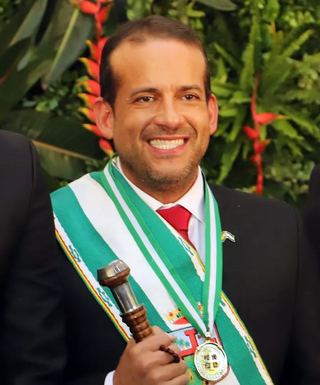
Luis Fernando Camacho Vaca is a Bolivian activist, businessman, lawyer, and politician serving as the 2nd governor of Santa Cruz since 2021. He is the leader of Creemos, opposition bench in the Plurinational Legislative Assembly and was the chair of the Santa Cruz Civic Committee in 2019.
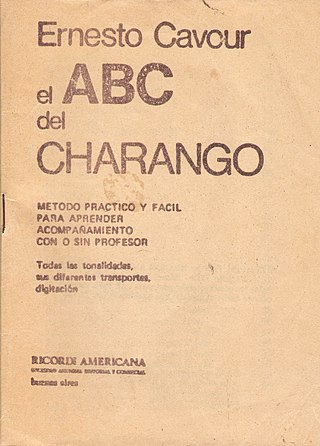
Ernesto Cavour Aramayo was a Bolivian singer, musician, inventor of musical instruments, and author of Bolivian music teaching books. He was a founding member of the group Los Jairas.
Creemos is a far-right coalition consisting of the Solidarity Civic Unity (UCS) and Christian Democratic Party (PDC) in Bolivia. It was previously an alliance, which fielded Luis Fernando Camacho as its candidate for president during the 2020 Bolivian general election where he garnered 14% of the vote.
The following is a chronology of notable events from the year 2023 in Bolivia.
References
- ↑ Aramayo, Ernesto Cavour (1994-01-01). Instrumentos musicales de Bolivia (in Spanish). Producciones Cima.
- ↑ Camacho, Fátima Molina (1995-01-01). 100 personajes al desnudo: entrevistas que cuentan las vidas de nuestros políticos, artistas, sindicalistas, periodistas y ciudadanos de a pie (in Spanish). F. Molina Camacho.